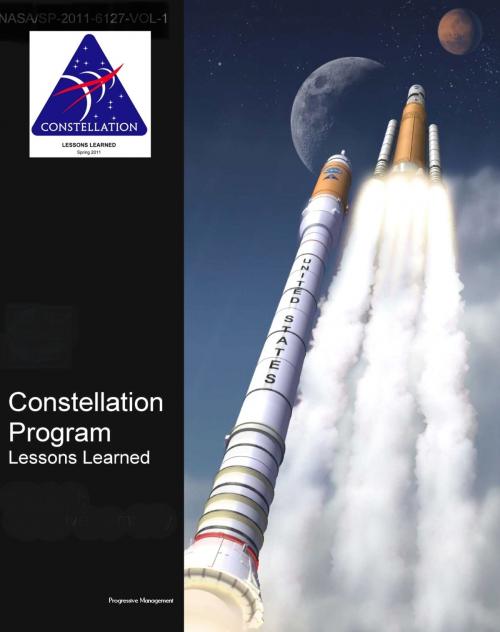NASA's Constellation Program: Lessons Learned (Volume I and II) - Moon and Mars Exploration Program - Ares Rockets and Orion Spacecraft
Nonfiction, Science & Nature, Science, Physics, Cosmology, Astronomy| Author: | Progressive Management | ISBN: | 9781465705747 |
| Publisher: | Progressive Management | Publication: | November 16, 2011 |
| Imprint: | Smashwords Edition | Language: | English |
| Author: | Progressive Management |
| ISBN: | 9781465705747 |
| Publisher: | Progressive Management |
| Publication: | November 16, 2011 |
| Imprint: | Smashwords Edition |
| Language: | English |
NASA has produced this two-volume special publication (SP-2011-6127) to document the lessons learned in the execution of the Constellation Program, which was developing the Ares rockets and the Orion Crew Exploration Vehicle for manned missions to the moon and Mars prior its cancellation by the Obama Administration in 2010. These volumes are converted for accurate flowing-text e-book format reproduction by World Spaceflight News.
Contents include:
Introduction * Context — "WHERE YOU STAND DEPENDS ON WHERE YOU SIT" * A Brief Description of the Program * The Program Environment — Key to Understanding the Lessons Learned * Program Scope * Program Funding * The Mosaic of NASA Participation * Phasing of Project/Program Start-up * Key Findings * Lessons Learned * Robust vs. Optimal Planning — The Only Certainty Is that the Funding Will Match the Plan * Schedule Creep and the Fixed Base — The Law of Diminishing Returns * Tailoring and the Design and Construction Standards — Drinking from a Fire * Tailoring Process Simplification —The Law of Unexpected Consequences * Risk-informed Design — Risk as a Commodity * In-house Tasks — Sustaining the NASA Institutional Base vs. Affordably Supporting the Programs — Getting from "or" to "and" * Roles, Responsibility, and Authority — a Non-thermodynamic Application of Entropy * Decision Making — Only as Efficient as Roles, Responsibilities, and Authorities Are Clear and Understood * Organization Is Organic — You'll Never Get It Right, But You Can Make It Bitter * Communication Among a Far-flung Team — Interpersonal Networks and Information Techology Applications Can Improve Bandwidth * Flight Tests — Learning by Doing * Development Process, Knowledge Capture, and Contributors * ACRONYMS
Volume I provides an executive summary of the lessons learned from the Constellation Program. Volume II provides more detailed analyses for those seeking further insight and information. Section 1.0 introduces the approach in preparing and organizing the content to enable rapid assimilation of the lessons. Section 2.0 describes the contextual framework in which the Constellation Program was formulated and functioned, which is necessary to understand most of the lessons. Context of a former program may seem irrelevant in the heady days of new program formulation. However, readers should take some time to understand the context. Many of the lessons would be different in a different context, so the reader should reflect on the similarities and differences in his or her current circumstances. Section 3.0 summarizes key findings, at the program level, developed from the significant lessons learned that appear in Section 4.0. Readers can use the key findings in Section 3.0 to peruse for particular topics, and will find more supporting detail and analyses in a topical format in Section 4.0. Appendix A contains a white paper describing the Constellation Program formulation that may be of use to readers wanting more context or background information. The reader will no doubt recognize some very similar themes from previous lessons learned, blue-ribbon committee reviews, National Academy reviews, and advisory panel reviews for this and other large-scale human space flight programs; including Apollo, Space Shuttle, Shuttle/Mir, and the International Space Station. This could signal an inability to learn lessons from previous generations; however, it is more likely that similar challenges persist in the Agency structure and approach to program formulation, budget advocacy, and management. Perhaps the greatest value of these Constellation lessons learned can be found in viewing them in context with these previous efforts to guide and advise the Agency and its stakeholders.
NASA has produced this two-volume special publication (SP-2011-6127) to document the lessons learned in the execution of the Constellation Program, which was developing the Ares rockets and the Orion Crew Exploration Vehicle for manned missions to the moon and Mars prior its cancellation by the Obama Administration in 2010. These volumes are converted for accurate flowing-text e-book format reproduction by World Spaceflight News.
Contents include:
Introduction * Context — "WHERE YOU STAND DEPENDS ON WHERE YOU SIT" * A Brief Description of the Program * The Program Environment — Key to Understanding the Lessons Learned * Program Scope * Program Funding * The Mosaic of NASA Participation * Phasing of Project/Program Start-up * Key Findings * Lessons Learned * Robust vs. Optimal Planning — The Only Certainty Is that the Funding Will Match the Plan * Schedule Creep and the Fixed Base — The Law of Diminishing Returns * Tailoring and the Design and Construction Standards — Drinking from a Fire * Tailoring Process Simplification —The Law of Unexpected Consequences * Risk-informed Design — Risk as a Commodity * In-house Tasks — Sustaining the NASA Institutional Base vs. Affordably Supporting the Programs — Getting from "or" to "and" * Roles, Responsibility, and Authority — a Non-thermodynamic Application of Entropy * Decision Making — Only as Efficient as Roles, Responsibilities, and Authorities Are Clear and Understood * Organization Is Organic — You'll Never Get It Right, But You Can Make It Bitter * Communication Among a Far-flung Team — Interpersonal Networks and Information Techology Applications Can Improve Bandwidth * Flight Tests — Learning by Doing * Development Process, Knowledge Capture, and Contributors * ACRONYMS
Volume I provides an executive summary of the lessons learned from the Constellation Program. Volume II provides more detailed analyses for those seeking further insight and information. Section 1.0 introduces the approach in preparing and organizing the content to enable rapid assimilation of the lessons. Section 2.0 describes the contextual framework in which the Constellation Program was formulated and functioned, which is necessary to understand most of the lessons. Context of a former program may seem irrelevant in the heady days of new program formulation. However, readers should take some time to understand the context. Many of the lessons would be different in a different context, so the reader should reflect on the similarities and differences in his or her current circumstances. Section 3.0 summarizes key findings, at the program level, developed from the significant lessons learned that appear in Section 4.0. Readers can use the key findings in Section 3.0 to peruse for particular topics, and will find more supporting detail and analyses in a topical format in Section 4.0. Appendix A contains a white paper describing the Constellation Program formulation that may be of use to readers wanting more context or background information. The reader will no doubt recognize some very similar themes from previous lessons learned, blue-ribbon committee reviews, National Academy reviews, and advisory panel reviews for this and other large-scale human space flight programs; including Apollo, Space Shuttle, Shuttle/Mir, and the International Space Station. This could signal an inability to learn lessons from previous generations; however, it is more likely that similar challenges persist in the Agency structure and approach to program formulation, budget advocacy, and management. Perhaps the greatest value of these Constellation lessons learned can be found in viewing them in context with these previous efforts to guide and advise the Agency and its stakeholders.















